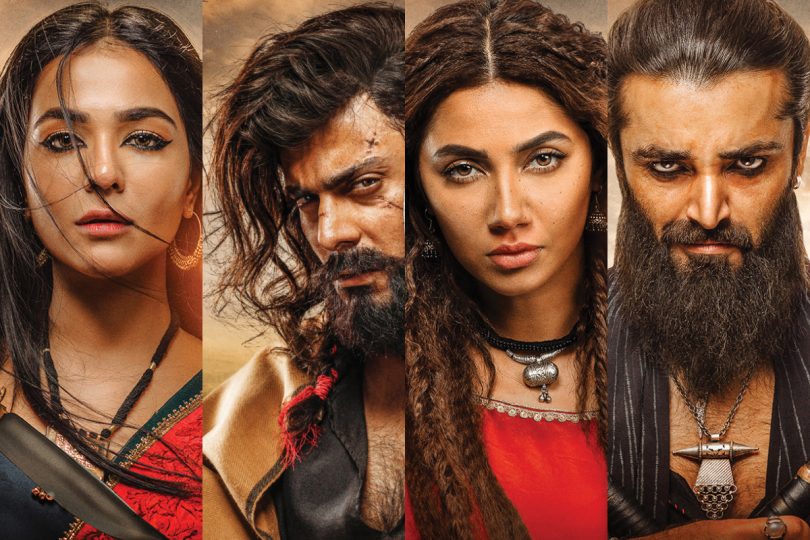Whenever the history of Pakistani cinema would be written, director Bilal Lashari will find a prominent place in it. It was his film Waar that kick-started the revival of Pakistani cinema in 2013, and nearly nine years later, he is back to save the cinema industry with his magnum opus The Legend of Maula Jatt.
What began as a remake culminated in a reboot of the famous Punjabi film that achieved cult status, not just in Pakistan but internationally as well. It is one of the few films from the Pakistani Punjabi cinema that nearly everyone has seen, and is often considered a game-changer since it heralded the rise of the Punjabi cinema that lasted for two decades.
Will Bilal Lashari’s The Legend of Maula Jatt have the same impact on the cinema industry that remains to be seen, since the film was released on October 13th, 2022 across the globe. However, those who had the privilege to watch the film believe that it will raise the bar for both the Pakistani cinema, and the film industry because the producers Ammara Hikmat and Dr. Asad Jamil Khan gave the film everything it deserved, resulting in a project that would remain etched in the minds of the audience.
Since the film has been in production for a long time, meeting the cast was an impossible task until it was made possible last week in Karachi. The whole cast was assembled from across the country – Fawad Khan from Lahore, Hamza Ali Abbasi from Islamabad, Mahira Khan, and Humaima Malik from Karachi – and made available for the Karachi press and that’s where most of us got to meet the men and women who have breathed life into the characters of Maula, Noori, Mukhoo, and Daro. BOLD had a chance to meet the four main characters of The Legend of Maula Jatt who explained their motivation behind reliving iconic characters, breathing in an era that predated electricity and their expectations from the film.

Comparing Maula Jatt with The Legend of Maula Jatt
Before we move on to the new Maula Jatt aka The Legend of Maula Jatt, one must talk about the original masterpiece that came out in the late 1970s and changed the course of cinema industry in Pakistan. At that time, the country was going through a Martial Law under Army General Zia ul Haq who had dethroned the Prime Minister Zulfiqar Ali Bhutto in a military coup. According to the makers of Maula Jatt, they tried to make an action film that catered to the angry youth of the country, who were being deprived of their right to speech freely.
Enters Sultan Rahi and Mustafa Qureshi as Maula Jatt and Noori Natt and they managed to tame the public with their violent acts, and thus began the trend of wild Punjabi films that was often referred to as Curry Westerns, as a tribute to the Spaghetti Westerns produced in Italy during the previous decade. Director Bilal Lashari teamed up with Nasir Adeeb, the writer of the original Maula Jatt to come up with a retelling of the hero’s origin and managed to cast the biggest names in the industry for the title role. Fawad Khan and Hamza Ali Abbasi are pitted against each other as Maula Jatt and Noori Natt (the roles played by Sultan Rahi and Mustafa Qureshi respectively), while Mahira Khan plays Mukhoo (Aasia Begum played the same in the original) while Humaima Malik makes Daro her own (as opposed to Chakori in the 1979 classic).

Had Maula Jatt not been a cult classic, it would have been easier for the actor to make the characters their own, but since it was a popular film when it was released, and has been watched by any across the world, the current actors found themselves under pressure while breathing life into the famous characters.
Fawad Khan said that Sultan Rahi and Mustafa Qureshi are veterans of our film industry and it would be unfair to compare him and Hamza Ali Abbasi to them. ‘I believe that it wouldn’t be correct to compare the protagonist and the antagonist of the original Maula Jatt to our film, because both films were made in different eras, and had to cater to a different kind of audience. We tried to come up with our original take on the central characters which can be referred to as a jugaar, in simple terms.’
On the other hand, Hamza Ali Abbasi thanked Mustafa Qureshi for portraying Noori Natt in such a manner that he left an imprint for him to follow. ‘Since I was playing the antagonist in The Legend of Maula Jatt, I was under pressure since I had big shoes to fill. I took that pressure positively and used the template left by Mustafa Qureshi to play Noori Natt in my own way, and if anyone says that it was built upon his performance, then that person would be correct because it was. He presented the basic layout to me so instead of starting the character from scratch, I knew Noori’s mannerisms, and after Bilal’s help, I was able to come up with my version of the character.’
While Hamza added that he would like to meet the original Noori Natt, Mustafa Qureshi and spend some time with him, he was also hopeful that the legend would approve of his performance.
In what can easily be termed as the film revolving around two men, Mahira Khan and Humaima Malik also play characters that are integral to the story. Mahira Khan plays Mukhoo, Maula’s love interest while Humaima’s Daro is Noori’s sister, and although the two played sisters in Bol, here they might be seen as rivals.
Mahira Khan described her character as someone who is there to lend a shoulder to Maula Jatt and add sizzle to what can come out as a revenge saga.
‘When I heard the story from Bilal Lashari, I asked him how Mukhoo is relevant to the plot, to which he first said that it adds colour, and later said that it adds fun. When he realized that I would understand it easily if explained in foodie terms, he said that the whole film is a meal, and Mukhoo is the beverage you drink so that it gets digested.’
Humaima Malik, who dominated the trailer with her hot look, claimed that she picked the character of Daro because it gave her a chance to do something that doesn’t land in an actor’s lap in Pakistan.
‘Daro is fearless, Daro is sensuous, Daro is daring, sexy and amazing and in short, Daro is me. She is everything a heroine can’t be and that’s why I chose to play the character that has a lot to do in the film.’
‘Fawad, Humaima make their respective comebacks with something they hadn’t done before’

Fawad Khan may have worked in multiple Hindi films in the last 10 years, but the last time he worked in a Pakistani film was way back in 2007, when the revival of cinema was nowhere in sight and the multiplex culture wasn’t introduced in Pakistan. On making his comeback after so long, Fawad Khan said that it wasn’t his fault that he stayed away from the screen, but something that was controlled by other factors.
‘I began working on three films back in 2018 including my home production Nilofar and crime caper Money Back Guarantee but due to Covid-19, none of them got released. The Legend of Maula Jatt is the first one to be released, and I am glad because it was the most hectic film amongst the rest. Yes, I was under pressure not because it was a huge film but because I am not a fluent Punjabi speaker, and the dialogues penned by Nasir Adeeb are in Shayirana (poetic) Punjabi. Secondly, the story takes place at a time when that predates electricity in Pakistan (smiles, as he mentions that it might still be unavailable in many parts of the country), so we had to prepare ourselves to live in that era. At first, I had problems regarding the language, but once I got it right, it was smooth sailing.
On the other hand, Humaima Malik who made a powerful film debut through Shoaib Mansoor’s Bol in 2011, appeared in a number of films including Raja Natwarlal in India, but none of the film did well at the box office, and she is hopeful that her Daro would change her luck.
‘What I did in Bol was different from what I am doing in The Legend of Maula Jatt; back then the audience praised my work while now I am praising my own work, because I know how hard it was for me to play something I am not.’

Maula Jatt vs Noori Natt – The rivalry that has no equal
Playing Maula Jatt and Noori Natt must have been anything but easy for Fawad Khan and Hamza Ali Abbasi respectively, but thankfully both the actors credited the other’s energy for what they describe as a powerful performance.
When Fawad Khan was asked about the secret to stellar chemistry with Hamza Ali Abbasi, he said that not knowing Hamza socially helped him in this regard.
‘Before we were cast opposite each other in TLMJ, Hamza and I barely knew each other. We have always been very cordial with one another and it was only after the shoot that we got to know each other and now we talk regularly. Not knowing him helped me big time because that translated well on screen, and I must say, I fed on his energy which was limitless and made Noori Natt amongst the most interesting characters of the film. I tried to match his energy and, in that process, developed a really good chemistry with him.’
Hamza Ali Abbasi also had an interesting take on the rivalry of the two characters, and he also credited his co-star for making him give his very best.
‘TLMJ is all about rivalry of Maula Jatt and Noori Natt. It is for the audience to judge our chemistry but let me tell you, I was blessed to have Fawad as Maula because his energy helped me a lot. When two actors are giving an intimate performance like we did, and if one of them is giving his best, then the other has to follow suit and that’s what happened with us here. His energy and performance helped me raise the bar.’

The transformation that landed one actor in hospital, another learning an ‘alien’ language
While Fawad Khan and Humaima Malik were making their comebacks through a Punjabi flick, Mahira Khan was moving into new territory after conquering Pakistani and Indian cinemas. Her only issue here was speaking Punjabi on screen, which was not an easy job for someone who has never spoken the language in real life.
‘I am an actor and when I signed the film, I realized that I had to learn Punjabi in order to make Mukhoo convincing enough for the audience. I had a Punjabi language instructor with me who helped me in this regard and I must also mention Bilal (Lashari) and Hamza (Ali Abbasi) who guided me whenever I found myself in trouble. In fact, I used to send voice notes to Nasir sahab (the writer of Maula Jatt and TLMJ) whenever I was unable to understand a word or its meaning, and when I was able to understand that word, it was easy for me to deliver that dialogue.’
For Fawad Khan, the language barrier was also there but he had bigger issues than learning the language.
‘We were lucky enough to find a very good action team from abroad, and I had less than two months to gain 20 kilograms before their arrival, which I did. However, since I am a Type 1 Diabetic patient, that weight gain didn’t suit me and I had to check into a hospital after the first spell of the action scenes was over. The pre-existing condition didn’t do me any favours since my kidneys stopped working, and I took time to recover.’
For Hamza Ali Abbasi, the Legend of Maula Jatt is more than a film, it is an opportunity to do something good for the country.

‘We have tried to achieve many milestones through this film, and it is up to the audience now to decide whether we were successful in our attempts or not. From the scale of the film, to the modern visual effects, get-ups, action sequences, etc., we have tried our best to give an international-level product to the audience which hopefully might open closed doors for our industry abroad. We would consider ourselves victorious if the public feels proud after watching the film, for which every one of us – from the spot boy to the director – gave their 200 percent.’
As for Humaima Malik, playing a vamp was the biggest challenge, which she took sportingly, and came out surprisingly well.
‘It was always going to be a gamble for me, to play a vamp in my comeback film, however, I consider myself an actor whose craft is not to play the heroine but to play any character. Daro gave me the chance to be spicier than the heroine, even if it had shades of grey. I believed myself to be Daro and that helped me play the challenging role without much difficulty.’
How TLMJ served as a reunion of sorts for the cast!
Although Fawad Khan and Mahira Khan became the ideal couple for the TV audience when they appeared together in Humsafar way back in 2011, they haven’t been able to share the screen since due to their busy schedule. The Legend of Maula Jatt not just brought them back together after 11 years but reunited Humaima Malik with his Akbari Asghari co-star for the first time since 2011.
Fawad Khan had the right answer for the occasion, and he said that while not knowing Hamza Ali Abbasi helped him in playing the protagonist better, knowing the leading ladies made it easier for him.
‘The kind of roles Mahira and I did in Humsafar or Humaima and I had in Akbari Asghari were poles apart from The Legend of Maula Jatt, however, the comfort zone factor was there which eased the process of reuniting with those with whom I had worked before.’
Mahira Khan also believed that the reunion being another language helped them rid of the Humsafar baggage which wouldn’t have been easy had they made a comeback in an Urdu play or film.
‘Many people wanted us to work together after Humsafar but I think we were busy in that regard. Sometimes a project was offered to both of us but either I was busy, or Fawad was, and that’s why nothing could materialize. Thankfully, with The Legend of Maula Jatt being in Punjabi helped us both since we were both learning the language along the way and that helped us get rid of the Humsafar baggage. Not only were we not required to recreate the nostalgia but also the chemistry that arose from speaking Punjabi helped us click together.’
Humaima Malik also had wise words to say about reuniting with Fawad – we are very lucky together.
While Fawad reunited with the ladies, Hamza Ali Abbasi’s reunion was with Waar Bilal Lashari with whom he was working after 8 years. Back in 2013, when Waar was being made, Hamza Ali Abbasi was trying to carve a separate identity for himself while in 2022, he has his own set of followers both online and offline.
‘Bilal and I are old friends and in fact when we were young, we saw Maula Jatt for the first time together. Working with him is not work at all, it’s like spending time together with a friend, and on the sidelines, we make a film.’
TMLJ sets the screen on fire, but without a song!
The first thing that would come to mind after watching The Legend of Maula Jatt would be the lack of songs, which are considered an integral part of Punjabi films in the region. When Mahira Khan was asked to give her two cents on the matter, she said that she wished there was a song in the film, but that would not have sat well with Bilal Lashari’s vision.
‘I sincerely wish that TLMJ would have had a song in it, but trust me, there was no scope for one here. It is a dark film about revenge, about trauma, about the history of the two main characters, it is surprising that it has Mukhoo in it.’

Finally, the million-dollar question – have you watched Maula Jatt?
Hamza Ali Abbasi was the first one to raise his hand, saying that since he used to be a film buff in his younger days, he had watched the film multiple times and considers it a must-watch flick.
Fawad Khan defends the decision of not watching the complete Maula Jatt by saying that a) he grew up abroad and b) he wasn’t well-versed in Punjabi language. He also adds that the film was released before he was born, and although he had seen parts of it, he has yet to see the complete version.
Humaima Malik’s answer was short and sweet, because the synopsis of her answer was ‘absolutely not’, but she added that she would now watch it once she is free.
Mahira Khan explained that she had seen Maula Jatt but only after saying yes to the reboot. ‘I had to watch a lot of Punjabi songs and Punjabi content to understand the body language, and mannerisms of ladies in the village, and that’s how I saw Maula Jatt but in bits and pieces. Bilal had told me not to watch it otherwise I would have gotten influenced by the Mukhoo of that era, but trust me, once I started speaking Punjabi, everything from my body language to mannerisms changed, and I became Mukhoo from Mahira Khan, in no time.’ -Ends







